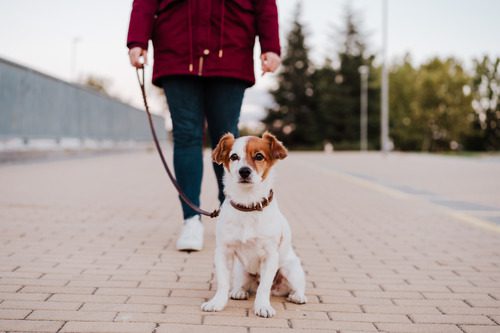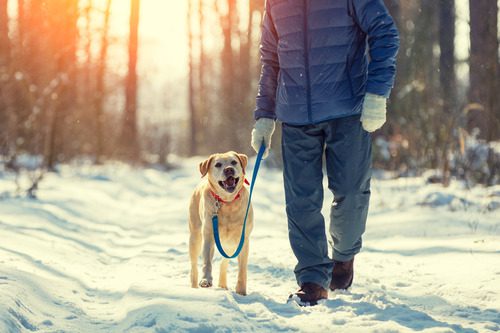Why is My Dog Itching All the Time in Plymouth Meeting, PA?
Most dog owners in Plymouth Meeting have no doubt experienced their best friend scratching at his ears, chewing at his paws, or just generally being itchy. Occasional dog itching is normal; however, chronic and excessive scratching can be a sign of something else.

The most common causes of dog itching are allergies, parasites, infections, or other issues. If these conditions are not treated, they can be painful and lead to additional problems.
5 Common Reasons for Dog Itching in Plymouth Meeting, PA
There are several reasons why a dog may be itchy, some of which include:
Skin Parasites
Unfortunately, dogs can be susceptible to a number of different skin parasites, especially if they spend a lot of time outside.
Some common skin parasites that can cause dog itching include:
Fleas
Fleas can make dogs itchy, and if your dog has flea allergies, these parasites can make your dog miserable. When fleas bite, their saliva causes skin irritation and results in hair loss, scabs, and overall discomfort because of the constant scratching.
Classic signs of flea infestations also include red bumps on the skin, and severe itching at the tail base, and on areas behind the back legs. Fleas can be easily prevented by using either topical or oral preventative medications.
Mange
Microscopic parasites called Sarcoptes can cause mange (scabies) in dogs, which results in skin irritation and itching. Sarcoptic mange is very contagious to other dogs, and can even be transmitted to humans.
Classic symptoms of scabies are the “pinnal-pedal reflex,” where the infected dog will scratch and itch the tip of the ear with the rear leg about 80% of the time. Treatment is available in the form of topical or oral medications.
Demodex
Another kind of mange, call demodectic mange, typically affects young dogs, puppies, or immunosuppressed adult dogs in Plymouth Meeting. Unlike sarcoptic mange, Demodex mites are not contagious to other dogs or humans.
Most of these cases start with a few spots of hair loss on the face, muzzle, or legs, and dogs are not necessarily itchy unless there is secondary bacterial infection is present. Treatment is available for young dogs, however, it can be challenging with older dogs with weaker immune systems.
Skin Infections
Bacterial and staph infections, commonly called “hot spots,” can also cause dog itching in Plymouth Meeting. Most of these infections are treatable; however, they usually appear in response to allergy issues.
The result is a cycle of itching and skin infections and typically occurs when a dog has already started scratching so much that it causes skin inflammation and damage. This in turn offers an environment for bacteria to colonize and cause infections.
Signs of staph infections or “hot spots” include chronic scratching, skin redness, rash, and scabs.
Yeast Infections
When a dog has a yeast infection, the skin often appears red, thickened, or a bit greasy. Yeast infections also cause a particular odor. The most common areas where yeast infections occur are inside the ears, the neck, face, armpits, abdomen, groin, and beneath the tail base.
As with staph infections and “hot spots,” yeast infections occur secondary to allergies and can cause a considerable amount of itchiness in your dog.
Ringworm
Ringworm isn’t a worm but is a fungal infection of the skin. It is caused by a fungus that dogs can pick up playing in the dirt or running around on the lawn. Ringworm typically doesn’t cause itchiness in dogs but is can cause bare patches in the hair coat, especially around the eyes and nose.
Since ringworm is contracted from the soil, it’s not usually contagious in other dogs and humans. However, if you have a cat with ringworm, it is contagious to humans and other animals.
Allergies
An allergy is a condition of hypersensitivity of the immune system to an allergen, a type of antigen, and are proteins produced by plants, grasses, insects, chemicals, foods, or other animals. Allergens tend to cause a vigorous immune response, releasing histamines which in turn cause inflammation, itching, and red skin.
The main cause of itchiness in dogs in Plymouth Meeting is allergies, and allergies in dogs can be placed into two main categories: Environmental and food.
Environmental Allergy
Dogs may be allergic to pollen, dust mites, mold spores, grasses, and a whole host of other common environmental allergens. Owners might see their dog licking his paws, rubbing his face, or shaking his head, along with scratching, rubbing, and hair loss on their legs, sides, and belly.
Paw licking often causes brown staining and redness on the tops and bottoms of the paws. Also, the inner ear flaps and outer ear canals can look red and irritated, and there may be a brownish ear discharge.
Allergy testing by your veterinarian in Plymouth Meeting, PA can help isolate environmental causes of allergies.
Food Allergy
When a dog is allergic to food (or even treats), he may show an allergic reaction by scratching at the face, ears, belly, armpits, feet, and scooting or licking the rear end. Ear irritation and infections are common with food allergies, too. Some affected dogs may also have digestive issues, like gas, increased number of bowel movements, or loose stools.
Food allergies are typically a result of a specific protein, or proteins in their food or treats, not necessarily the grains.
See a Veterinarian for Your Dog’s Itching in Plymouth Meeting, PA
Dogs that are constantly itching and scratching are often miserable and uncomfortable, especially if the itching causes inflamed skin and secondary bacterial infections. Therefore, it is very important to determine the exact cause of the itching in your dog, and in some dogs, there may be more than one cause of this condition.
If your dog is itching excessively, contact your veterinarian. At The Village Vets in Plymouth Meeting, we can help narrow down the causes of itchiness in your best friend, and offer solutions and measures for relief. Your dog’s health and comfort are always our top priorities, so we always do everything we can to keep them as happy and healthy as possible.
For additional information or questions, please feel free to contact our animal hospital. Our compassionate staff is available and ready to help your pet.
Recent Posts
About The Village Vets
The Village Vets of Plymouth Meeting offers excellent service to clients in a comfortable, friendly atmosphere. To learn more about us and how we can better serve you and your pet here in Plymouth Meeting, PA, click the button below.
Share This Post
Recent Posts
About The Village Vets
The Village Vets is a network of three animal hospitals based in Atlanta, GA and the surrounding area. We offer honest, excellent service to our clients in a comfortable, friendly atmosphere. To learn more about our locations and how we can better serve you and your pet, click the button below.




